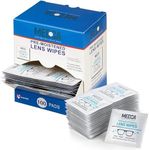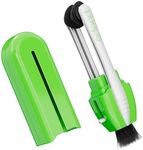Buying Guide for the Best Eyeglass Cleaners
Choosing the right eyeglass cleaner is important for keeping your lenses clear, scratch-free, and comfortable to wear. With so many options available, it’s helpful to understand what makes a cleaner effective and safe for your glasses. The best choice depends on your lens material, coating, and how often you clean your glasses. By focusing on a few key features, you can find a cleaner that fits your needs and keeps your eyewear in top condition.Type of CleanerEyeglass cleaners come in several forms, such as sprays, wipes, and cleaning solutions. Sprays are convenient for home use and can be paired with a microfiber cloth, while pre-moistened wipes are great for on-the-go cleaning. Cleaning solutions may require mixing or rinsing. The type you choose depends on your lifestyle—if you travel a lot, wipes might be best, but for regular home use, a spray or solution could be more economical and effective.
Lens CompatibilityNot all cleaners are safe for every lens type, especially if your glasses have special coatings like anti-reflective or blue light filters. Some cleaners contain chemicals that can damage these coatings over time. Always check if the cleaner is labeled as safe for coated lenses. If you’re unsure about your lens type, choose a cleaner that specifically mentions compatibility with all lens materials and coatings to avoid accidental damage.
IngredientsThe ingredients in eyeglass cleaners can affect both cleaning power and safety. Alcohol-based cleaners are effective at removing oils and smudges but may be too harsh for some coatings. Alcohol-free formulas are gentler and safer for most lenses but might require more effort to remove stubborn dirt. If you have sensitive skin or allergies, look for hypoallergenic or fragrance-free options. Your choice should be guided by your lens type and any personal sensitivities.
Residue and StreakingA good eyeglass cleaner should leave your lenses clear, without streaks or residue. Some cleaners, especially those with strong chemicals or poor-quality wipes, can leave behind marks that make your glasses harder to see through. If you notice streaks after cleaning, you may need a different formula or a better-quality cloth. For the clearest results, look for products that advertise streak-free or residue-free performance.
Ease of UseHow easy a cleaner is to use can make a big difference in how often you clean your glasses and how well you do it. Sprays and wipes are generally the simplest, requiring just a quick application and wipe-down. Solutions that need rinsing or mixing can be more time-consuming. If you want a quick, hassle-free experience, choose a product that fits your daily routine and doesn’t require extra steps.
PortabilityIf you often need to clean your glasses while out and about, portability is important. Small spray bottles and individually wrapped wipes are easy to carry in a bag or pocket. Larger bottles or bulk solutions are better suited for home or office use. Think about where and when you usually clean your glasses to decide which size and packaging will be most convenient for you.

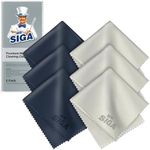
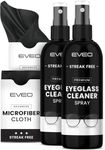
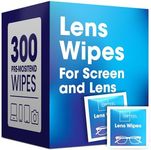

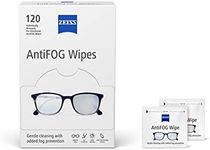
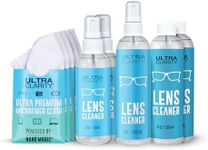
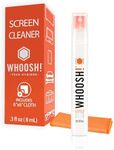
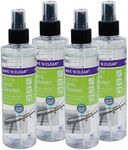
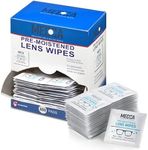

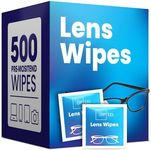
![Lens Cleaning Wipes - [210 Pack] Pre Moistened Cleansing Tissues & Cloths and Individually Wrapped Eyeglass Cleaner Wipe Pads for Phones, Tablet Screens, Helps Clean Cameras, Electronics, Photo Lens and Optics](https://images-proxy.bestreviews.guide/2nHxtbZjQdVUmJv-d--gGZzTcfY=/0x150/https://m.media-amazon.com/images/I/51aMv8JiB9L._AC_CX679_.jpg)
![Lens Cleaning Wipes - [105 Pack] Pre Moistened Cleansing Cloths and Individually Wrapped Eyeglass Cleaner Cleaning Tissues & Cloths Wipe Pads for Phones, Tablet Screens, Helps Clean Cameras, Electronics, Photo Lens and Optics](https://images-proxy.bestreviews.guide/oRZJ56CZE_YDq5iZk69ADkyWJcI=/0x150/https://m.media-amazon.com/images/I/51xkKi26ZlL._AC_CX679_.jpg)
